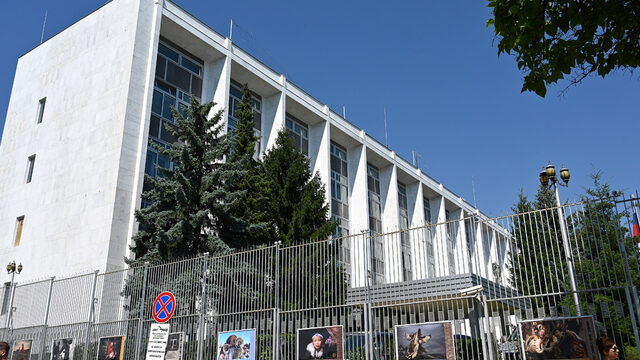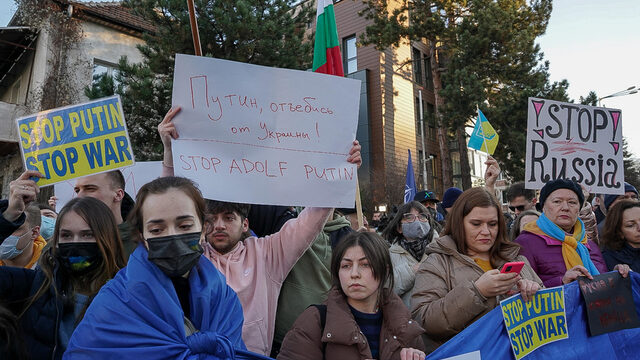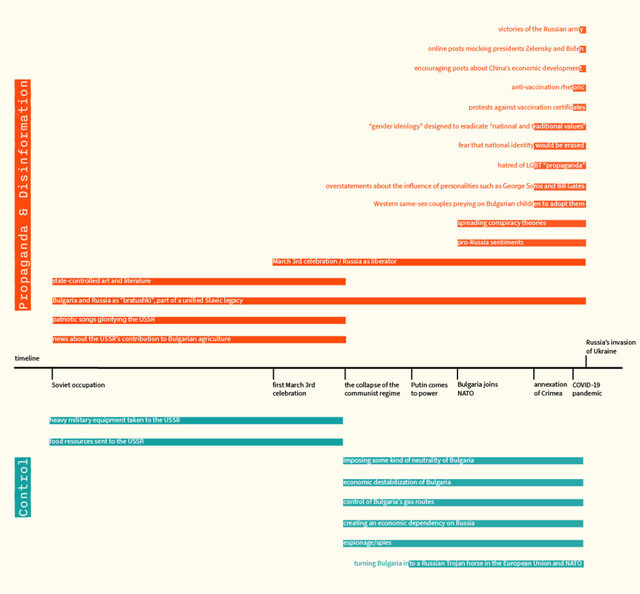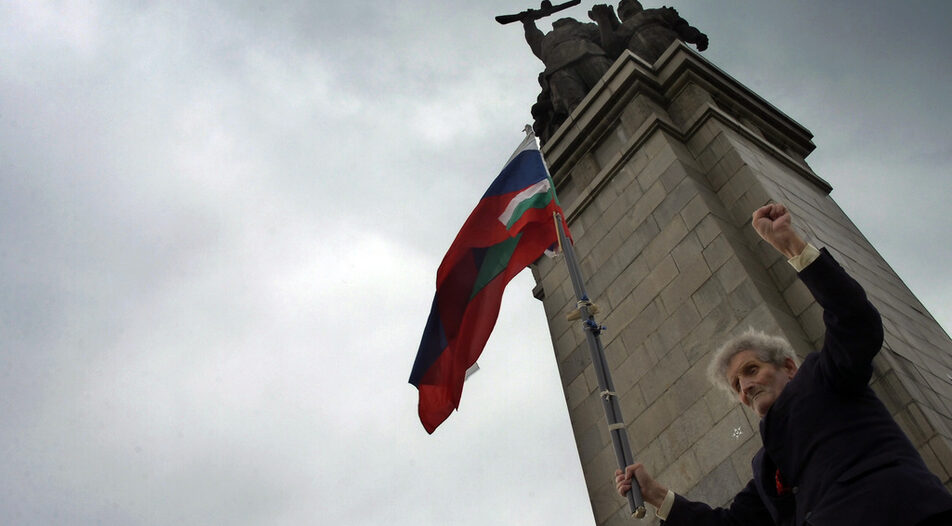EU and NATO member Bulgaria, once Moscow's closest satellite, has been moving away for years, albeit at a slow pace, from Russia's pull. This process has been accelerated following Russia's invasion of Ukraine. However, the Kremlin can still count on an array of friendly politicians, spies, and a disinformation and propaganda network to further its interests in Sofia.
By mid-summer, 2022 is already shaping up as one of the most turbulent years in the Bulgarian-Russian diplomacy.
Over 80 Russian diplomats have been expelled in the first seven months of the year, and 70 of them received a personae non grata status on June 28 - a memorable goodbye from outgoing PM Kiril Petkov, whose reformist cabinet was ousted by the opposition, and a way to kickstart his next election campaign by showing that he is firmly in the Western camp when it comes to sanctioning Russia. This comes after a number of exchanges between government officials and the Russian ambassador Eleonora Mitrofanova, and the severance of ties with Russia's Gazprom after Sofia refused to pay for gas in rubles, as the Russian company had demanded. The latter may, however, turn out to be a blessing for Bulgaria, as it revived ambitions to stop the economic dependency on Russia for good by being supplied with Azeri gas through a new interconnector with Greece. Also, batches of LNG were imported from the US.
The row with Moscow came as Russia invaded Ukraine and Bulgaria sought to give an answer to that which was, by no means an easy task, as the country was caught between the need to act in concert with its Western allies and, especially, the EU, Ukraine's calls for help, and the opposition of those still clinging to the "brotherly" ties with Russia.
"It's a different feeling when you see with your own eyes three rockets flying 200 meters from you - it's madness to feel safe in that situation", said Petkov on May 2 during a TV interview after returning from his meeting Zelensky where the two agreed on Bulgarian factories repairing Ukraine's heavy weapons and the biggest town on the Black Sea, Varna, becoming a hub for Ukraine's grain exports. "We can choose Orban's Hungary way of being soft to Russia and call it a "military operation" but there's another way: to say it clearly that rockets shouldn't crash into residential blocks, with kids' toys and notebooks being the only thing left in the pile."
However, despite the prime minister's firm statements, the outgoing cabinet was divided in its response to the war as the ruling coalition included not only the parties determined to maintain a line common with that of Bulgaria's Western partners, but also the pro-Kremlin Bulgarian Socialist Party. Both the Socialists and President Rumen Radev, who over the years has made several statements that were favorable to Russia, became increasingly skeptical even about Bulgaria's condemnation of Vladimir Putin's politics.
The recent events might be described as Bulgaria's biggest row with Russia and most significant attempt to move away from Moscow's sphere of influence since the late XIXth century.
"Russian espionage is very much at home in Bulgaria"
Longtime journalist, former TV host, book author and popular blogger Ivo Indzhev says that a lot of what currently motives Russia to meddle in Bulgaria's affairs is the country indeed supplying Ukraine with weapons without officially saying so (an investigation by Capital from April 22 indicated this happens through Denmark, Slovakia, Czech Republic, Germany, Spain, Slovenia, Poland, Romania, Lithuania and Estonia) and also the production of an improved version of the Soviet AK-47. "Apart from that, the interest of Russian espionage in Bulgaria is focused on the creation of paramilitary organizations, with the direct participation of Russian instructors, as well as on creating political organizations with the aim of destabilizing Bulgarian's position as an ally of the West."

"From what I know, Russian espionage is very much at home in Bulgaria, it's a regional hub for such activity", Indzhev says. "The effect from the Russian propaganda is destructive. Because of this, many Bulgarians cannot make a difference between good and evil, the aggressor and the victim. Media in Bulgaria holds responsibility for this too."
Indzhev sees the recent claims by MP Lena Borislavova of We Continue the Change of journalists, politicians and intellectuals receiving around 2000 euro per month to spread pro-Kremlin's views as very possibly true. "The deep entrenchment of Russian spies here is so pervasive that some Russian commentators rightly scoff at the expulsion of the so-called diplomats from Bulgaria - it's practically unnecessary due to the simple truth that Bulgaria can't hold any secrets from Russia and that's always been the case."
In March 2021, the Prosecution initiated police raids which resulted in the detention of six people for espionage, including three from the Ministry of Defense.
On September 24, 2020, two Russian diplomats suspected of espionage on Bulgaria's military were named personae non grata.
In January 2020 two Russian diplomats were expelled although Anatoliy Markov, Russia's then-ambassador, complained that he was not officially informed about the charges.
Earlier, in September 2019, Nikolay Malinov, leader of a pro-Russian NGO, the Russophile National Movement, was charged with spying. At the same time, a former senior Russian intelligence officer, Leonid Reshetnikov, was barred from entering Bulgaria.
None of the people charged with espionage have received a sentence. Malinov is still active with his NGO.
In 2020, the Prosecution stopped the investigation on the Russia-linked case of poisoning of firearms dealer Emilian Gebrev, allegedly with the Novichok agent in April 2015, although this was never confirmed as the probes disappeared during tests in Finland. The case remains unsolved despite the fact that three Russian citizens who entered Bulgaria with fake names and counterfeited documents were suspected in the affair.
The war caused several more expulsions of Russian diplomats this spring but to some, that's not nearly enough.
"Democratic Bulgaria" member Stefan Tafrov, a former MP and a former ambassador to UK, France, Malta and Italy, is calling for reducing the number of Russian diplomats; according to his estimations, they are around 112 at the moment. 70 of them got expelled on June 28.
He tells us that the growing discontent towards the attitude of Russian ambassador Eleonora Mitrofanova should be more openly challenged and he described Mitrofanova's politics as arrogant. Mitrofanova has repeatedly insisted that many Bulgarians support Moscow. "The majority of the Bulgarian nation is against the anti-Russian rhetoric from the government about the special operation in Ukraine," Mitrofanova told Russian TV channel Rossiya 24 on Monday and dismissed the We Continue the Change party as "clerks" to the EU.
Tafrov is adamant that the current crisis draws a line in the Russian-Bulgarian diplomacy and it might be a while before there's further cooperation: "Until Putin's regime is in power the relationship between Russia and Bulgaria will be frozen, kept at minimum, in case there's need of consular protection", Tafrov claims.
On March 31, without providing further information, PM Kiril Petkov voiced suspicions that Russian intelligence had worked against improving relations with North Macedonia over numerous historical disputes.
On June 30, in an interview with the Bulgarian National Television, Mitrofanova directly said that the pro-West attitude of Petkov is the reason he's not in office any more. "If he had changed his rhetoric, he might have had a longer political future", she said, criticizing the expulsions.
The deep-rooted Russian meddling in Bulgaria and the brotherly nations narrative
New times call for different approaches in propaganda. "Russian influence in Bulgaria and its instruments and rhetoric have been changing through Bulgaria's recent history", longtime journalist, writer and political commentator Emilia Milcheva claims. In Milcheva's view, Russian influence has changed in the 90's in the way that it no longer lies that much on propaganda. Moscow rather relies on its economic leverages, especially on the energy market, and on contacts from the repressive former State Security agency of the totalitarian regime. The latter is a still controversial topic for Bulgaria as files of widely recognized personalities who served as agents - from politics to art - have been slowly uncovered, mostly after 2008.
However, pro-Russian voices and outright propaganda are present both on traditional and social media platforms, and they become more active and louder when the society's opinion needs to be firmly on Russia's side. "Ukraine is letting itself fall by its own hands", states a website called pogled.info. Another one, durjavnik.bg, quotes statements by Chechen and pro-Putin leader Ramzan Kadirov. Popular radio host Peter Volgin openly supports the Kremlin on Bulgarian National Radio while the marginal nationalist party Bulgarian Military Union has over 8 thousand subscribers in Telegram receiving constant updates about how Russia is "cleansing" the region and will stand strong against the "global elites". Generic Facebook groups with names like "I love my mother" have been activated to spread propaganda in favor of the Kremlin and against the pro-Western government of PM Kiril Petkov and We Continue the Change (their changing names can be easily tracked by the public group history log). These are just some of the examples.
Data expert Nikola Tulechki of Factcheck.bg estimates that several hundred people are involved with spreading misinformation in Bulgaria. "Multi-level marketing schemes are drafting people with lower income, sometimes of elderly age. They are usually paid per comment and get a percentage if they manage to attach somebody else to the scheme", Tulechki says.

Milcheva says that despite Bulgaria breaking from the USSR's sphere of influence in 1989, a lot of the Soviet rhetoric stayed in the public consciousness of the society - including the rhetoric about Russia as a brotherly nation to Bulgaria, a sort of a guarantor of Bulgaria's identity because of the Russo-Ottoman War (1877-1878), ending with a win for Russia, which is seen as a major event in Bulgaria being reinstated as an independent country. In recent years and especially amid the invasion in Ukraine, the traditional March 3 celebrations for Bulgaria's Liberation Day have been a point of heated discussions. There are growing feelings that Bulgaria should re-examine its view of Russia as a liberator and rather celebrate much more visibly the Unification Day, on September 6, which commemorates the unification of the Ottoman province of Eastern Rumelia and the principality of Bulgaria in 1885, was a more important event. And while many see March 3 as a traditional celebration, it started being commemorated in 1978, when the country was still a Communist satellite of the USSR.
Milcheva adds that a lot of the narratives about Bulgaria and Russia being "bratushki" and part of a unified Slavic legacy, have been instilled in the public opinion, generation after generation. "Back then, after 1989, Russian influence relied on old models. In retrospect, even the anti-Russian and anti-communist rhetoric of the pro-West parties back in the day now appears somehow muted because in the 90's one didn't make the connections that some of the first [business] groups such as "Multigroup" [an investment company which in 1992 started gas company Overgas with Russia's Gazprom, and was headed by tycoon Iliya Pavlov, killed in 2003] were instruments for backstage scheming to make Bulgaria economically unstable. Gazprom's ambition to control all gas routes in Bulgaria during the governance of Jean Videnov [PM from Bulgarian Socialist Party, criticized for sending the country in an inflation in 1996-1997] was not something that challenged the society's trust in Russia."
Russian rhetoric returned during the accession to NATO and the plans to re-activate the power plant in Belene, with Vladimir Putin and Bulgarian President Georgi Parvanov, back then a member of Bulgarian Socialist Party, meeting in 2008 to solidify their relationship.
"But the true propagandist bacchanalia started after 2014, along with Russia's annexation of Crimea, Kyiv's Euromaidan movement and the initiation of the breakaway states of Donetsk and Lugansk", says Milcheva. "If up until then, the Russian influence was over imposing some kind of neutrality in Bulgaria, following the occupation of Crimea, there were fully blown hybrid information wars."
"The events in Ukraine in 2014 and the COVID-19 pandemic in 2020 were like detonators for false news cycles. Disinformation, especially in regards to the pandemic and the vaccination, found a fertile soil in Bulgaria", says Milcheva. "Skepticism to the vaccination is acting as skepticism against science and West's achievements. Russian propaganda obviously has big resources in Bulgaria, now famous to be the EU and NATO's weak spot."
She observes that a lot of the narratives running wild in the Russian media and through Kremlin's channels quickly took hold in Bulgaria too, sometimes with a spin that's relevant for the country's context - like for example fake news around the recent release of sailors from a ship that was stranded in embattled Mariupol since the onset of the invasion which some reported to be blocked by Russian forces, others by Azov troops holding the crew hostage. Milcheva shares the sentiment that circulation of fake news as well as users posting pro-Kremlin opinions under news articles intensifies when a consensus, different from the Russian narratives, takes hold in the country.
As support for Putin is going down, pro-Russian propaganda is being stepped up
On June 20, a Gallup International poll indicated that 59 percent are against the Kremlin's aggression in Ukraine. 23 per cent support Putin's politics, others are unsure about what is going on.

"Putin indeed lost support in Europe because his campaign in Ukraine has failed, not just from an informational point of view but also from a military point of view. The whole world is depicting him as the evil personified and naturally this changes how he is viewed here. Now those engaged with the propaganda are expected to tone down the importance of his failure", says data expert Nikola Tulechki, part of the team of the platform Factcheck.bg. "Since the beginning of the invasion, pretty much all resources have been focused on reports around the war."
The team is engaged with verifying various doubtful news reports but also politicians' statements which have turned out to be untrue (some of the recent examples was Bulgarian Socialist party leader Kornelia Ninova who claimed in a TV interview that Germany has made no contributions to the Ukrainian army or that Poland, who cut ties with Gazprom at the same time as Bulgaria, has agreed on paying in rubles after all). "Naturally, most of the disinformation is coming from Russian sources."
Tulechki says there are some bits which have originated locally - like the fake news that EU and NATO have declined helping Bulgaria in covering damages caused by wildfires in 2007. There have been disinformation bits coming from Ukraine too - like Ukraine's Armed Forces claiming that Google Maps has made Russian bases visible.
Tulechki sees the Russian rhetoric in Bulgaria and the way it transfers from chats and social media, to official media and statements from politicians, as a result of the work of "skilled propagandists".
What would those skills require? "It's after all a specific craft to make a huge portion of the society think in a certain way, identify with certain ideas. In modern context, this is done by an organization of people, rather than an individual. There are people who are tech-savvy and know how to develop social media pages and groups. There are people who know how psychology works and can formulate easily understood messages, analyze the feedback and see what is making waves and what isn't. There are people working in IT, who can create numerous websites publishing the same content or navigate hundreds of social media profiles. All of this requires quite a lot of organizational skills as it's not only about managing all layers but also paying trolls for publishing content", Tulechki explains.
"What I think is the truly important question is what would the situation be in the worst case scenario, having in mind the resources invested in Russian propaganda - for example, what Bulgaria would look like if Putin succeeded in his aims and Yanukovich was still the President of Ukraine. And that's a scary thought."
EU and NATO member Bulgaria, once Moscow's closest satellite, has been moving away for years, albeit at a slow pace, from Russia's pull. This process has been accelerated following Russia's invasion of Ukraine. However, the Kremlin can still count on an array of friendly politicians, spies, and a disinformation and propaganda network to further its interests in Sofia.












